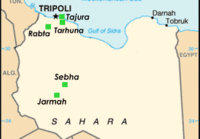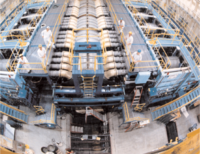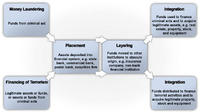-
The Israeli military prepares for a new type of war
The Israel Defense Force (IDF) has created a new military command – the Strategic Depth Command; this new command, and the new, commando-heavy, look of the IDF’s higher echelon, should tell us that Israel is preparing for a new type of war; adversaries of Israel who have been entertaining the thought that sheer distance from Israel would offer them some protection, may want to think again
-
-
Yet another mysterious explosion in an Iranian nuclear facility
A powerful explosion rattled Iran’s third-largest city Isfahan early Monday evening Iran’s time (late morning EST); a major nuclear weapons-related facility is located eight miles from Isfahan; the facility is used for processing uranium so it can be fed into uranium enrichment centrifuges; the massive blast is the latest in a series of mysterious explosions in Iran during the past two years – explosions which not only destroyed military facilities and development centers, but which also wrecked natural gas transport facilities, oil refineries, bridges, and other infrastructure assets; the blasts have caused dozens of deaths, disrupted Iran’s nuclear weapons program, and inflicted damage on key infrastructure
-
-
Israeli defense minister Ehud Barak on Iran, U.S., and war
Israeli analysts note that Prime Minister Benjamin Netanyahu and Defense Minister Ehud Barak have been pushing for a military action against Iran, but that they were thwarted by senior officials in the Israeli national security establishment; with these officials retiring, it appears that Netanyahu and Barak may get their way; On Tuesday, Barak gave a wide-ranging interview to Kol Israel radio station, in which he addressed this and other Iran-related issues
-
-
Rumor of war: Is Israel about to attack Iran?
There is an increasingly heated debate in Israel, accompanied by leaks from high ups in the government, about a coming Israeli military attack on Iran; four developments have created a climate more hospitable to an Israeli military action: the progress Iran has made in its effort to build nuclear weapons — and the exposure of this progress in an IAEA report due out this week; changes at the top of the Israeli national security establishment — changes which saw individuals more favorable to an attack on Iran replace individuals who were adamantly opposed to military action; growing understanding between Israel, Saudi Arabia, and Jordan; and the coming elections in the United States; these developments have convinced Prime Minister Benjamin Netanyahu and Defense minister Ehud Barak — both proponents of an attack on Iran’s nuclear facilities — that a window has been opened for an Israeli military action against Iran
-
-
U.S. looks to keep Libyan WMD scientists away from terrorists

With Libyan rebels consolidating their hold over the country, the United States is looking to restart a State Department program designed to keep top Libyan biological and nuclear scientists from working for terrorist organizations or hostile nations; Libya’s new leaders have expressed their interest in working with the United States to keep track of Libyan WMD scientists and on other counter-proliferation programs, but the interim government has yet formally to respond to U.S. requests
-
-
NNSA, AFRICOM in WMD workshop in East Africa
The National Nuclear Security Administration (NNSA) and the U.S. Africa Command (AFRICOM) concluded a week-long border security workshop in Dar es Salaam, Tanzania, as part of a joint effort to enhance security at ports and borders in the region
-
-
Two radiation generators help protect U.S.

One aspect of a nuclear explosion— the electro-magnetic pulse, or EMP — was much discussed during the cold war: scientists argued that exploding a nuclear bomb in the skies high above the United States would create an EMP which would disrupt electronic equipment and paralyze the nation; two remarkable pulsed-power machines used to test the U.S. defenses against atomic weapons have surpassed milestones at Sandia National Laboratories
-
-
Combating the financing of terrorism

Terrorist organizations rely on financing and support networks to sustain operations and launch attacks. The U.S. Department of the Treasury has developed a sophisticated and comprehensive approach to identify, disrupt, and deter the funding networks of terrorist organizations
-
-
Pakistani man attempted to ship nuke materials to home country
Last Friday, a Pakistani man pleaded guilty for conspiring to ship nuclear materials to individuals with alleged ties to his country’s government
-
-
We are in an "era of terror": individuals, small groups can kill on a mass scale
Graham Allison, the director of the Belfer Center for Science and International Affairs at the Harvard Kennedy School of Government, discusses nuclear terrorism in a post 9/11 world, the progress the United States has made at home and abroad in securing loose nuclear weapons and materials, the need to strengthen security measures protecting low-grade nuclear stockpiles at hospitals, and the dangerous threat that nuclear terrorism still poses
-
-
Apathy a "central threat" to nuclear security, says expert
Corey Hinderstein, the vice president of the International Program at the Nuclear Threat Initiative, looks back on the progress made in securing loose nuclear material in the ten years since 9/11; more specifically, Hinderstein discusses the likelihood of al Qaeda obtaining a nuclear bomb or nuclear material, bolstering security at medical and industrial facilities that have stockpiles of low-grade nuclear material, and the dangers of apathy
-
-
TSA: Aviation security "stronger and more secure" ten years later
Lisa Farbstein, a spokesperson for the Transportation Security Administration (TSA); discusses new technologies implemented by TSA and DHS and the agency’s shift to a more risk-based approach to passenger screening
-
-
Groups seek FCC ruling on BART’s cell phone shutdown
An ongoing legal battle in California over whether law enforcement agencies can shut off cell phone service could set the precedent for policies across the United States; in response to the Bay Area Rapid Transit’s (BART) decision to shut down its mobile phone service during a planned protest, several digital rights groups are urging the U.S. Federal Communications Commission (FCC) to take swift action
-
-
U.S. makes nuclear fuel available to other countries
The United States announced the availability of a reserve stockpile of low-enriched uranium (LEU) for use in nuclear fuel; the LEU is derived from down-blended surplus military material; the LEU will be made available to countries interested in nuclear power generation, thus making it unnecessary for these countries to develop their own uranium-enrichment technology
-
-
Statistics helps calculate uncertainty of aging U.S. nukes

How do you test a not-so-young nuclear stockpile for the effects of age when you cannot detonate any for the sake of finding out? The U.S. government has not conducted live nuclear tests since the early 1990s, but a BYU scientist offers solid answers — based on statistical analysis and without setting off any weapons
-
- All
- Regional
- Water
- Biometrics
- Borders/Immig
- Business
- Cybersecurity
- Detection
- Disasters
- Government
- Infrastructure
- International
- Public health
- Public Safety
- Communication interoperabillity
- Emergency services
- Emergency medical services
- Fire
- First response
- IEDs
- Law Enforcement
- Law Enforcement Technology
- Military technology
- Nonlethal weapons
- Nuclear weapons
- Personal protection equipment
- Police
- Notification /alert systems
- Situational awareness
- Weapons systems
- Sci-Tech
- Sector Reports
- Surveillance
- Transportation
Advertising & Marketing: advertise@newswirepubs.com
Editorial: editor@newswirepubs.com
General: info@newswirepubs.com
2010-2011 © News Wire Publications, LLC News Wire Publications, LLC
220 Old Country Road | Suite 200 | Mineola | New York | 11501
Permissions and Policies
Editorial: editor@newswirepubs.com
General: info@newswirepubs.com
2010-2011 © News Wire Publications, LLC News Wire Publications, LLC
220 Old Country Road | Suite 200 | Mineola | New York | 11501
Permissions and Policies
